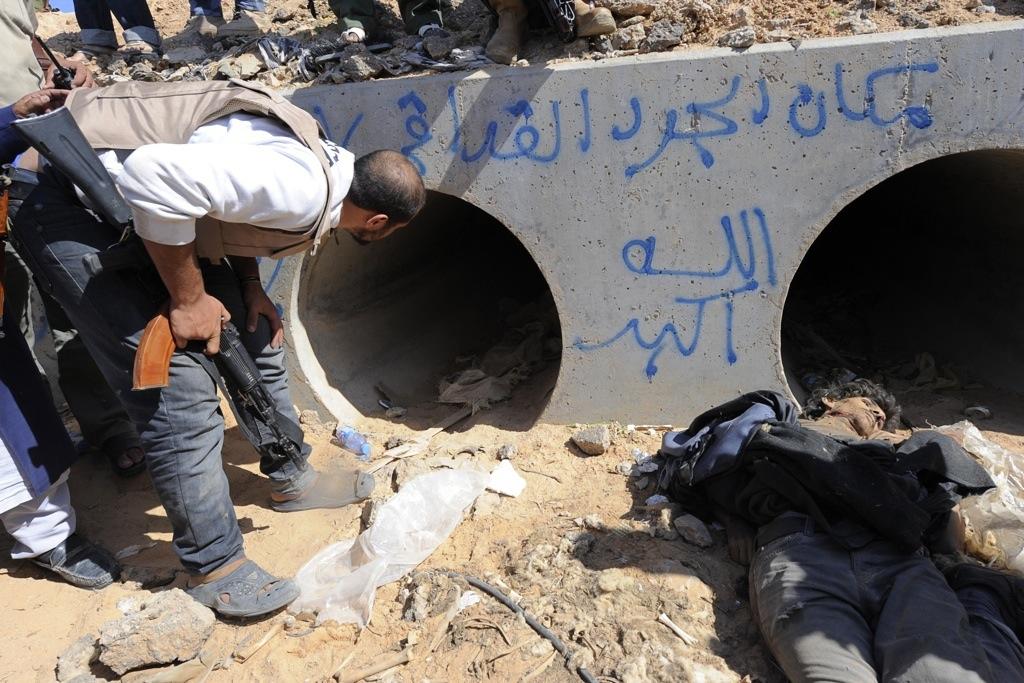Gaddafi is dead: What now for Libya?
A Libyan National Transitional Council (NTC) fighter looks through a large concrete pipe where ousted Libyan leader Muammar Gaddafi was captured, with a dead loyalist bodyguard in the foreground, in the coastal Libyan city of Sirte on October 20, 2011. Arabic graffiti in blue reads: “This is the place of Kadhafi, the rat.. God is the greatest.”
AMMAN, Jordan — “Sic Semper Tyranus,” as the Romans, who once ruled Libya, said. Thus always to tyrants.
And what a spectacular tyrant Muammar Gaddafi was.
His megalomania surpassed even that of Saddam Hussein, and his eccentricities were legendary. His all-girl bodyguards, and his desire to sleep in a tent on visits to the western world seemed simply ridiculous. But he had oil, and that’s all it took for the western world to take him seriously. And the West put up with his risible antics as long as the oil flowed.
Gaddafi became a pariah, and Libya isolated by sanctions, when he was linked to the 1988 Lockerbie bombing which killed 270 people.
More from GlobalPost: A look at the life of Muammar Gaddafi
In 2003 Gaddafi made a deal in which he gave up his nuclear capability in exchange for rehabilitation in the community of nations. It meant that the brutalities of his dictatorship were politely overlooked in western capitals.
Despite the provisional Libyan government's desire to take him alive and to put him on trial, there was never much of a chance of that happening. His battered and bloodied body, chucked into the back of a truck, was the sort of rough justice he could have expected. One thinks of Ngo Dinh Diem’s body in the back of an armored personnel carrier in Saigon, 1963.
Gaddafi's death had none of the dignity of Julius Caesar’s death. It resembled more the death of Benito Mussolini, who also once ruled Libya, caught trying to flee, taken out and shot, his body hanged up side down in a Milan gas station.
Here in the Arab world, the death of Gaddafi represents the first of their tyrants to die at the hands of his people in the course of the Arab Spring. The odds are that he will not be the last. I can hear shouts in the street outside my window in celebration here in Jordan.
More: Gaddafi's female bodyguards claim they were raped
It is indicative that no one seems to agree just who pulled the trigger, or triggers, on Gaddafi. Libyans are fatally divided into tribes, clans, regions, and can agree on little. There is a lot of talk today about how now, with the tyrant dead, Libyans can move ahead to build their democracy. I wouldn’t count on it any time soon. For compared to what lies ahead, toppling the Gaddafi regime was the easy part. How to make a modern country out of the repressed mess that Gaddafi left behind is a challenge indeed.
So tight was Gaddafi’s dictatorship that Libya never developed as neighboring Tunisia did, even though Tunisia had its own dictatorship.
The danger is that Libya, now that Gaddafi is gone, will fall apart into squabbling factions, like Somalia. Such a fate is by no means certain. If Libya’s fragile leadership can pull the country together the worst can be avoided. But it would be naive to think that Libya will now move smoothly towards democracy.
Yes, it is a momentous day for Libya. But there is an even more momentous task ahead.
The story you just read is accessible and free to all because thousands of listeners and readers contribute to our nonprofit newsroom. We go deep to bring you the human-centered international reporting that you know you can trust. To do this work and to do it well, we rely on the support of our listeners. If you appreciated our coverage this year, if there was a story that made you pause or a song that moved you, would you consider making a gift to sustain our work through 2024 and beyond?
